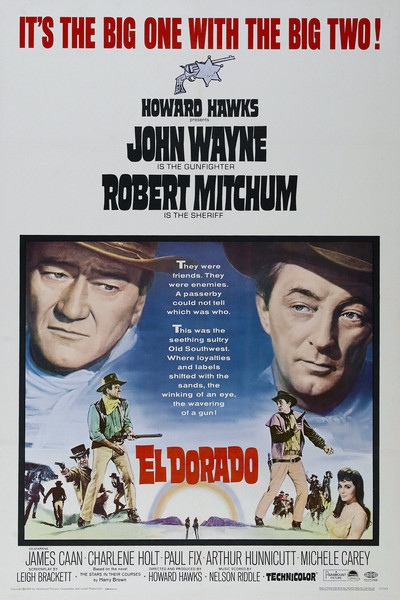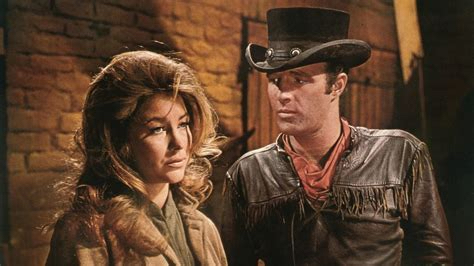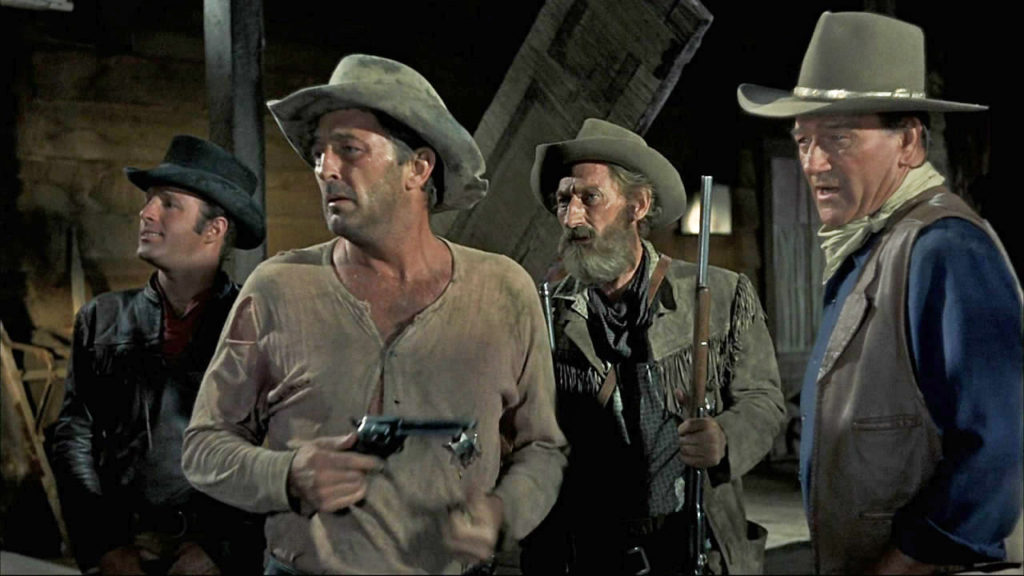Week of March 1 – 7, 2020
I’m beginning this new category with the 1967 western I’ve come to believe is my favorite John Wayne film, El Dorado. Readers with great memories may recall that I cited the 1962 western, The Man Who Shot Liberty Valance, as my # 10 favorite film when I listed them in my final Filmbobbery print issue. At the time I listed Hatari! and El Dorado as others that did not quite make my top fifteen favorites. But times change and tastes evolve. I still love Liberty Valance but it isn’t something I search out and see a great deal. But every time El Dorado finds its way onto a channel I’m watching, or if I have a hankering to watch old Duke (I like old Duke better than young Duke), I find my way to El Dorado. No, it isn’t as good a film as Rio Bravo, the 1959 western it so closely emulates. But I like it better, and I’m pretty sure that I always have.

At left is the poster used to promote the film in 1967. It pretty much sucks, with a tagline that is so phallic it could never be utilized for a family-oriented film today. Even the artwork is bad, losing all of the top half to the stupid words and billing, and then squeezing all the other merits of the cast into crowded corners. There are a host of great John Wayne movie posters over the years, but this is not one of them. Thankfully, the movie itself is so good that it will make you forget you saw this sad eyesore of promotional pandering.
As great as Rio Bravo is, I believe El Dorado is almost as good, and flat out more enjoyable. It’s fun to see John Wayne playing aging gunfighter Cole Thornton, not so old that he can’t make out with comely Maudie (Charlene Holt), or teach a few tricks of the trade to Allan Badillion Trahearn (better known as Mississippi, played by James Caan before he hit the big time). It’s fun to watch Robert Mitchum slip from sharp sheriff to drunken has-been, being punched cross-eyed by the Duke after a not-so-warm welcome. It’s fun to see Arthur Hunnicutt take on the Walter Brennan role as Bull, the loyal, crafty old “Indian-fighter”, and such fixtures as Paul Fix and R. G. Armstrong with key supporting roles. But as much as I love John Wayne in this movie, I love the way he cedes the spotlight to the young people who really deliver the goods in this Howard Hawks adventure.
That would be Caan, who is simply outstanding as the knife-throwing Mississippi, unable to leave Thornton to face gunfighter Nelse McLeod (Christopher George) and his gang. Caan may be the best thing about this movie; I can’t take my eyes off of him and I love to quote his dialogue (“I have a host of friends!”). Christopher George isn’t the handsome devil you might remember from innumerable 1960s and ’70s movies and TV shows; McLeod has a scar running down the left side of his face — but he’s still the fastest draw in the film, and loves to prove it. It is a character portrayal of top-notch quality, especially when he gives Cole Thornton “professional courtesy.” Finally, there are Charlene Holt as Maudie, and especially lovely Michele Carey as Josephine “Joey” McDonald, easily the bravest of the put-upon family that Bart Jason (Ed Asner) is trying to cheat out of their water rights. Michele Carey never had the career that she deserved, but she acted with John Wayne, Elvis Presley, Frank Sinatra and several other legends of the screen. She is wonderful in the role, and always wonderful to watch.

The finest aspect of the film is its performances, but close behind is the scriptwriting of Leigh Brackett, which is clever, smart, funny and finds the best ways to convey nuance in every instance. It provides Wayne, Mitchum and company very natural dialogue to keep the plot moving but enjoy the camaraderie along the way. It specializes in duo dialogue, whether it be Wayne and Caan, Wayne and George, Caan and Carey, or Wayne and Holt, allowing the characters to banter lightheartedly even while facing long odds of their survival. It is far more humorous than Rio Bravo, which Brackett also co-wrote, and the humor is honest and often charming.
The story is familiar, yet interesting. The McDonald family is being bullied by Bart Jason for their water rights, and Jason calls in a gunfighter to help turn the tide in his favor. His first choice is Thornton, who turns him down, mainly because he likes Sheriff J. P. Harrah (Robert Mitchum). But the youngest McDonald boy is shot by Thornton and Joey takes revenge as he rides away from the ranch after delivering the boy. Several months later Thornton and Mississippi ride into El Dorado in the dark, knowing that Nelse McLeod is Jason’s new hired gun. Harrah is now a drunk, but harsh circumstances force him into action to try to save the McDonalds and his job, and with the help of his friends, he gets by. Jason is arrested and held in the jail, but McLeod and Jason’s men keep trying to get him out, or some sort of an advantage over the sheriff. Eventually they do, and Jason is let free. Another McDonald is shot, and a showdown looms. Can wounded Cole Thornton and J. P. Harrah take on the greedy rancher with just a young man whose main weapon is a knife, and a kooky old “Indian fighter” with a bow and arrow and a bugle? Of course they can; this is why movies are made, and so fun to watch.
At its heart, El Dorado is an ode to friendship, and that is perhaps why it strikes such a chord with me. (I would love to be one of the gang!). Cole Thornton puts a higher premium on his friendship with J. P. Harrah than to take a job rousting ranchers in his district. Thornton and Mississippi strike up an uneasy friendship that deepens with every minute. Bull is as loyal as a dog to Harrah, and then to Harrah’s friends Thornton and Mississippi. It is an idealized group of men who, simply because they know the difference between right and wrong, and like each other, stand up against the greedy rancher to risk their lives and jobs against wealth and power. And along the way, romance a couple of fine-looking, spirited women. What could be better than this?

Duke Wayne had, by 1967, entered his elderly period of films. He would continue to headline films for another decade, most of them westerns, but other types as well as movie tastes moved away from the Wild West. True Grit, and an Oscar, were just two years away. But this is how I best like to remember the Duke — genial but grumpy, able but also able to let others carry the load, still romantic enough to kiss the girl, smart enough to admit when he is wrong, reluctant but willing to accept help, yet still the leader in a time of crisis. A man with moral authority who always tries to do the right thing, even when he does not profit from his decision. And he tries to teach others to do the same, whether it be Mississippi or Nelse McLeod, or the drunken sheriff whom he still believes is redeemable.
El Dorado was a big hit back in 1967; it was the thirteenth highest-grossing movie of the year. Since then it has only increased in stature, despite its frequent comparisons to Rio Bravo, and Rio Lobo, which followed it in 1970. It is available on DVD and Blu-Ray, it is available for streaming and often plays on satellite and cable channels (I know, for I have watched it several times in the past few years). The magazine “Cowboys and Indians” chose to feature it as its movie to watch in the March issue this year. It has a strong IMDb rating of 7.6, if that matters, and a host of positive reviews. But take it from me, if you need to relax and watch a good old-fashioned movie with spirit and fun, you can’t go wrong with El Dorado. It even features poetry! ☆ ☆ ☆ 1/2. Backdated to 1 March 2020.
Similar movies include the original version of The Magnificent Seven (1960); Hatari! (1962); The Professionals (1966); Silverado (1985); Gunga Din (1939); Butch Cassidy and the Sundance Kid (1969); and, of course, Rio Bravo (1959).
